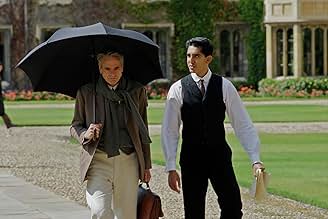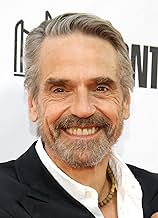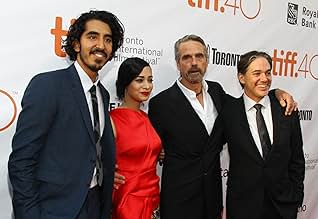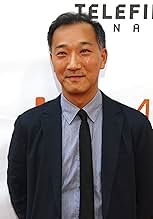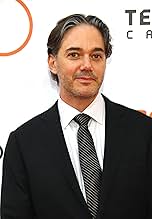The story of the life and academic career of the pioneer Indian mathematician, Srinivasa Ramanujan, and his friendship with his mentor, Professor G.H. Hardy.The story of the life and academic career of the pioneer Indian mathematician, Srinivasa Ramanujan, and his friendship with his mentor, Professor G.H. Hardy.The story of the life and academic career of the pioneer Indian mathematician, Srinivasa Ramanujan, and his friendship with his mentor, Professor G.H. Hardy.
- Awards
- 1 win & 3 nominations total
Dhritiman Chatterjee
- Narayana Iyer
- (as Dhritiman Chaterji)
Kevin McNally
- Major Percy Alexander MacMahon
- (as Kevin R. McNally)
- Director
- Writers
- All cast & crew
- Production, box office & more at IMDbPro
Featured reviews
Just saw this film at the SF Film Festival. I thought it was excellent. Why? It combines various levels of entertainment: the intellectual mathematics involved and the realities of academic competition; the historical and cultural conflicts between Indian and English traditions, attitudes, biases, and beliefs; the emotional love/friendship between men, between men and women, and between children and parents; and inhumanity towards other humans: warmongers vs. pacifists, religious vs. non-religious, individuals vs. groups, misunderstandings and lack of emotional intelligence in so many ways.
I comprehended very little of the mathematics involved but that did not matter and did not change my overall appreciation for the story and all the levels involved.
Kudos to all who created this film. The writing, the acting, the cinematography, the direction, all excellent...
I comprehended very little of the mathematics involved but that did not matter and did not change my overall appreciation for the story and all the levels involved.
Kudos to all who created this film. The writing, the acting, the cinematography, the direction, all excellent...
So far, 21st century biopics have been very kind to real-life 20th century scientists and mathematicians. Some of them were fairly well-known before getting the big-screen treatment and some
not so much. 2016 offers up "The Man Who Knew Infinity" (PG-13, 1:48), a biopic about the most famous genius you probably never heard of. Indian mathematician Srinivasa Ramanujan may not have the international renown of Stephen Hawking (featured in 2014's "The Theory of Everything") and the cinematic portrayal of Ramanujan's life may not offer the gravitas of helping to win World War II ("The Imitation Game", also from 2014), the mass appeal of a sports backdrop (2011's "Moneyball"), the excitement of a heist film ("21" in 2008), the controversy of early sex research (2004's "Kinsey") or the Oscar cred of a Best Picture winner ("A Beautiful Mind", from 2001), but "The Man Who Knew Infinity" brings us a story of tenacity, triumph and tragedy in the world of mathematics that deserves its own moment of discovery.
Popular British actor (of Indian descent) Dev Patel (from "Slumdog Millionaire" and the "Best Exotic Marigold Hotel" movies) plays Ramanujan, a young Indian man who fought prejudice and overcame numerous other obstacles in order to bring his particular genius to light. With little formal education and struggling to survive financially in the eastern Indian city of Madras (now, Chennai), he pursues his fascination with numbers by developing mathematical theorems that should've been well beyond the ability of someone from such humble circumstances. The only way for his highly advanced abilities to really develop further and for his discoveries to have meaning and a lasting impact, is to get help from leading mathematicians outside India. Leaving India, however, would violate his strict Hindu beliefs and cause him to leave his young wife, Janaki (Devika Bhise), and his mother (Arundhati Nag), who has no other surviving children. It's a lot to overcome, but Ramanujan's genius must be shared with the world.
A letter from Ramanujan to British mathematician G. H. Hardy (Oscar winner Jeremy Irons) impresses Hardy so much, he invites Ramanujan to join him at Cambridge University's Trinity College. With help from his friend and colleague, John Littlewood (Toby Jones), Hardy works to fill in the gaps in the young Ramanujan's education so the men can maximize what they can accomplish together. Ramanujan chafes under Hardy's rigid approach to developing his abilities, but the two eventually reach a happy medium between Hardy's insistence on "academic rigor" and Ramanujan's need to follow his intuition as far and fast as he can. The protracted fight that was World War I further complicates Hardy and Ramanujan's working relationship, as do religious differences between them, poor treatment of Ramanujan by some at Trinity, his long-term separation from his wife and mother and Ramanujan's own health problems.
"The Man Who Knew Infinity" makes its difficult subject matter relatable and entertaining, while enlightening and educating its audience. I, for one, had no idea that the modern world of mathematics was so intricate and deep. The script by Matthew Brown (based on Robert Kanigel's book of the same name) gives us just enough of the math (and simply enough) that we understand the uniqueness of Ramanujan's gifts and the importance of his work, but rightly concentrates on the more personal stories of the individuals who were involved in this real-life drama. The challenges of Ramanujan's interpersonal relationships in Cambridge are interspersed with scenes between his wife and mother back in India, reminding us of the sacrifices made by Ramanujan and others so that he could make a difference. Brown also directs and does a good job at making this little-known story accessible and interesting and he is helped by excellent performances from his entire cast, especially Irons and Patel. It may not be "The Imitation Game" or "A Beautiful Mind", but "The Man Who Knew Infinity" is worth getting to know. "B+"
Popular British actor (of Indian descent) Dev Patel (from "Slumdog Millionaire" and the "Best Exotic Marigold Hotel" movies) plays Ramanujan, a young Indian man who fought prejudice and overcame numerous other obstacles in order to bring his particular genius to light. With little formal education and struggling to survive financially in the eastern Indian city of Madras (now, Chennai), he pursues his fascination with numbers by developing mathematical theorems that should've been well beyond the ability of someone from such humble circumstances. The only way for his highly advanced abilities to really develop further and for his discoveries to have meaning and a lasting impact, is to get help from leading mathematicians outside India. Leaving India, however, would violate his strict Hindu beliefs and cause him to leave his young wife, Janaki (Devika Bhise), and his mother (Arundhati Nag), who has no other surviving children. It's a lot to overcome, but Ramanujan's genius must be shared with the world.
A letter from Ramanujan to British mathematician G. H. Hardy (Oscar winner Jeremy Irons) impresses Hardy so much, he invites Ramanujan to join him at Cambridge University's Trinity College. With help from his friend and colleague, John Littlewood (Toby Jones), Hardy works to fill in the gaps in the young Ramanujan's education so the men can maximize what they can accomplish together. Ramanujan chafes under Hardy's rigid approach to developing his abilities, but the two eventually reach a happy medium between Hardy's insistence on "academic rigor" and Ramanujan's need to follow his intuition as far and fast as he can. The protracted fight that was World War I further complicates Hardy and Ramanujan's working relationship, as do religious differences between them, poor treatment of Ramanujan by some at Trinity, his long-term separation from his wife and mother and Ramanujan's own health problems.
"The Man Who Knew Infinity" makes its difficult subject matter relatable and entertaining, while enlightening and educating its audience. I, for one, had no idea that the modern world of mathematics was so intricate and deep. The script by Matthew Brown (based on Robert Kanigel's book of the same name) gives us just enough of the math (and simply enough) that we understand the uniqueness of Ramanujan's gifts and the importance of his work, but rightly concentrates on the more personal stories of the individuals who were involved in this real-life drama. The challenges of Ramanujan's interpersonal relationships in Cambridge are interspersed with scenes between his wife and mother back in India, reminding us of the sacrifices made by Ramanujan and others so that he could make a difference. Brown also directs and does a good job at making this little-known story accessible and interesting and he is helped by excellent performances from his entire cast, especially Irons and Patel. It may not be "The Imitation Game" or "A Beautiful Mind", but "The Man Who Knew Infinity" is worth getting to know. "B+"
This is such a touching tribute to this amazing, brilliant man of humble beginnings. First off, there were a few moments in the film that dragged a little bit. I would have also preferred a little more development of some of the characters, however, it did not take away from my appreciation and enjoyment of this film. There is an underlying message to this story, and whether you're a man of science or metaphysics or spirituality, you will find satisfaction! Patel and Irons did a splendid job in this film. Patel is easily becoming a favorite of mine--he has that subtle intensity that is so mesmerizing and engaging. Irons, well, he is a seasoned actor and one of my all-time favorites. In his role here, he is very believable, showing emotion where it is needed, never overacting, always giving justice to his character. This film will make you laugh, it will break your heart, it will make your spirit soar, and if you have no math inclinations, it will inspire you and make you appreciate its beauty, its usefulness and contribution to the world of mathematics as we know it today!
The Man Who Knew Infinity is a lush, romantic biopic in the tradition of Hollywood's grand biographical melodramas of yesteryear. It is broadly accurate, if rather sentimental, but also somewhat superficial. We're constantly told that Ramanujan's work is important and ground- breaking, yet the screenplay mostly fails to demonstrate why this is so. We're shown how difficult life is for a vegetarian in England during the Great War, yet, oddly, it's never explicitly stated that the resulting vitamin deficiencies contributed directly to Ramanujan's demise. But for me the biggest flaw is the misplaced romance between Ramanujan and his wife, Janaki, when the more compelling romance is the intellectual one that unfolds between Ramanujan and G.H. Hardy. In reality, Janaki was nine or ten when Ramanujan married her in 1909, and only 14 or 15 when he left India for England. She was certainly not the ripe beauty portrayed in the film, and there is no real evidence that their arranged marriage was any kind of grand passion. The film is also strangely coy in avoiding any direct reference to Hardy's homosexuality. Perhaps the writer was being scrupulous about not implying any sexual aspect to the relationship with Ramanujan. Whatever the reason, it's an omission that makes Hardy less dimensional and airbrushes his sexuality from history as completely as a 1950s Hollywood biopic might have done. That aside, Jeremy Irons gives what might well be the best performance of his career as Hardy. It's a compelling and deeply touching portrayal. More surprisingly, Dev Patel - after a series of exuberant but lightweight performances - finally proves to be an actor with some depth and range. The film is also deftly directed, with some gorgeous cinematography.
Just saw "The Man Who Knew Infinity" at The Sun Valley Film Festival. So happy to see quality films make their US premiere in Sun Valley. Kudos to the non profit group. Must see movie with outstanding story, production and casting led by J. Irons. Independent films like these deserve to be seen & noticed. Opens NY/LA late April. Superb direction from Matt Brown with incredible sets and locations, especially location at Trinity College. Thought about the diversity issue facing the Academy and after seeing this movie, realized it was an issue for a brilliant mind like the lead against the English back in the day. The effort it took to make this film on a tight budget with incredible locations is a credit to the entire crew!
Did you know
- TriviaThroughout his life, Srinivasa Ramanujan was plagued by health problems. His health worsened in England. A 1994 analysis of Ramanujan's medical records and symptoms by Dr. D. A. B. Young concluded that it was much more likely he had hepatic amoebiasis, an illness then widespread in Madras, rather than tuberculosis. He had two episodes of dysentery before he left India. When not properly treated, dysentery can lie dormant for years and lead to hepatic amoebiasis. Amoebiasis was a treatable and often curable disease at the time.
- GoofsCambridge was not bombed by Zeppelins in World War I.
- Quotes
Littlewood: Don't be intimidated. Great knowledge comes from the humblest of origins.
- Crazy creditsCard before the title: "Mathematics, rightly viewed, possesses not only truth but supreme beauty." - Bertrand Russell
- ConnectionsFeatured in The Saturday Show: Episode #1.24 (2016)
- How long is The Man Who Knew Infinity?Powered by Alexa
Details
- Release date
- Countries of origin
- Official sites
- Languages
- Also known as
- El Hombre Que Conocía El Infinito
- Filming locations
- Production companies
- See more company credits at IMDbPro
Box office
- Budget
- $10,000,000 (estimated)
- Gross US & Canada
- $3,866,794
- Opening weekend US & Canada
- $80,325
- May 1, 2016
- Gross worldwide
- $12,252,684
- Runtime
- 1h 48m(108 min)
- Color
- Aspect ratio
- 2.39 : 1
Contribute to this page
Suggest an edit or add missing content







